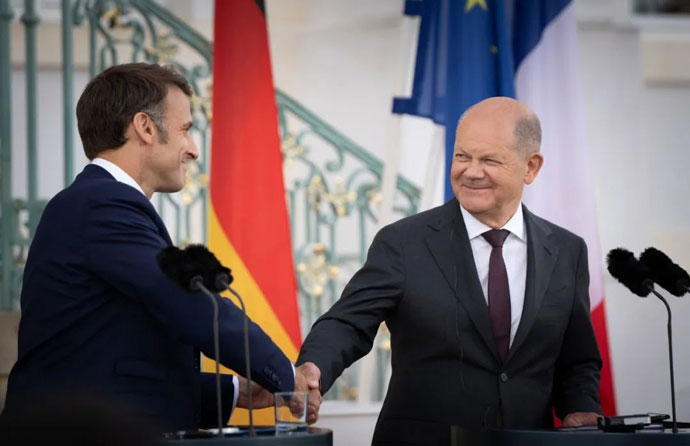Dong Yifan, Associate Research Fellow, Belt and Road Academy of Beijing Language and Culture University
Oct 08, 2024
Continued conflation of economic issues with geopolitical concerns may hinder Europe’s ability to reverse its gradual decline of influence within both emerging industries and the broader international economic landscape. Ultimately, it will squander its limited resources.

Dong Yifan, Associate Research Fellow, Belt and Road Academy of Beijing Language and Culture University
Jun 20, 2024
The two countries seek to show their commitment to advancing European sovereignty. Unfortunately, the United States will not allow it, as it believes greater autonomy for Europe would diminish NATO’s influence across the continent.
Wu Zhenglong, Senior Research Fellow, China Foundation for International Studies
Sep 02, 2022
The European Union will see sanctions through regardless of cost. Meanwhile, it is feeling the backlash. As pressure continues to advance, the trouble will ferment, eroding their resolve. Will the EU be able to tough it out? That’s anything but certain.

Leonardo Dinic, Expert in Geopolitics and International Business, the Future of Work, and Emerging Technologies
May 14, 2020
While the Eurozone is increasingly at risk of fracture, China benefits most from a unified Europe. China should be weary of European skepticism towards China’s aid during the COVID-19 crisis, especially as the EU debates its own internal dilemmas.

Feng Zhongping, Director, Institute of European Studies, Chinese Academy of Social Sciences (CASS)
Apr 23, 2020
Populist forces increasingly make it hard for the EU to move forward. Now, the pandemic has triggered a new set of problems, impeding interaction between China and Europe.

Beth Smits, PhD candidate, Paul H. Nitze School of Advanced International Studies (SAIS), Johns Hopkins University
Oct 13, 2017
A look at the timeline for when the European Union’s financial centers acquired the infrastructure necessary to be considered as offshore hubs for the Chinese currency provides a new angle to consider how Beijing plans to internationalize its currency.

Dan Steinbock, Founder, Difference Group
Jun 30, 2017
The new rapprochement between Brussels and Beijing involves converging economic interests between Europe and China – and diverging strategic interests between Europe and America. While the shift was conceptualized as a reaction to a policy vacuum created by Trump, in reality, the ties between Brussels and Beijing have grown steadily since the 1990s, even when U.S.-Chinese ties have fallen under pressure.

Zhang Bei, Assistant Research Fellow, China Institute of International Studies
Jun 29, 2017
The vote is a rejection of the “Hard Brexit” plan to take the UK out of both the Single Market and the Customs Union, and allows for the first time wide-range, cross-party dialogue on the goals of Brexit and perhaps a real opportunity to form a consensus.
Chen Xiangyang, Director and Research Professor, CICIR
Mar 13, 2015
The current international situation is rife with change, uncertainty and crisis in the Middle East, Asian Pacific, and Europe, largely due to shifting world power. Chen Xiangyang overviews changes and contradictions around the globe from a realist perspective on power relations.
Vasilis Trigkas, Visiting Assistant Professor, Schwarzman College, Tsinghua University
Feb 12, 2015
A Greek exit from the EU would lead to increased instability in Europe. Yet, it may present opportunity for China, the U.S. EU, and IMF to engage together in a summit to safeguard the stability of the Eurozone and shape a global norm on tax evasion and tax heavens that have adversely affected insolvent states like Greece.
Back to Top

- China-US Focus builds trust and understanding between the U.S. and China through open dialogue among thought leaders.
- Our Offerings
- Topics
- Videos
- Podcasts
- Columnists
- Research Reports
- Focus Digest
- Stay Connected
-
Thanks for signing up!
- Get the latest stories from China-US Focus weekly.